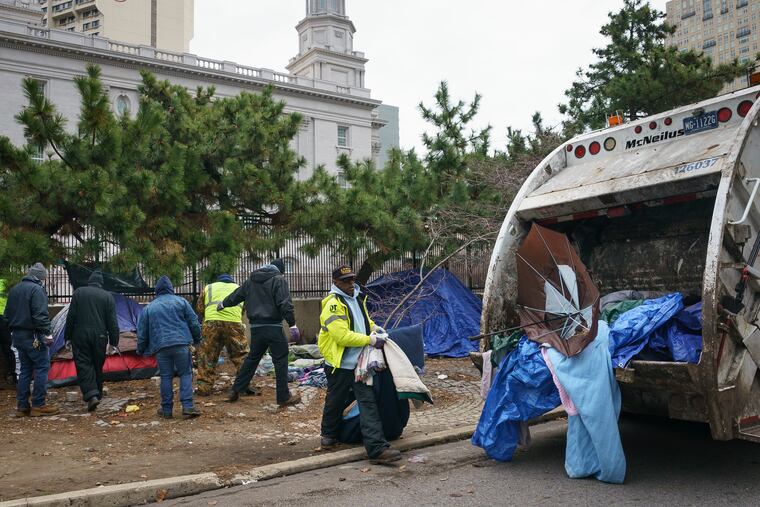Homeless encampment at 18th & Vine Streets cleared
The city evicted the people who had been living there based on laws prohibiting camping in city parks.

A homeless encampment that began two years ago on the walkway along Vine Street between 17th and 18th Streets was cleared away on Monday morning, a tiny community razed in 40 minutes with rakes, shovels, and a garbage truck.
Workers from Philadelphia’s Department of Parks and Recreation removed 18 tents from the space — technically park land stretching about two-thirds of a block and consisting of dirt, trees, and gray paving stones — located between the I-676 trench and the rear of a building that is part of the Cathedral Basilica of SS. Peter and Paul.
Eight people were asked to leave the site Monday morning; 14 had vacated in previous weeks.
The move was one of three carried out Monday by the city, which also swept away tents on grassy areas near I-676 ramps at Fifth and Wood Streets and 16th and Wood. About a half-dozen people were living at those locations, city officials said.
Met with consternation by Vine Street encampment residents and conflicted feelings by advocates for the homeless, the city’s actions were undertaken with sensitivity as well as ample warning periods, officials said. Further, tents were taken down with the knowledge that beds were available for everyone being displaced.
Encampments in Center City have increased in the last year, according to Sister Mary Scullion, executive director of Project HOME, the homelessness advocacy agency. “Rents are increasing and income is not," she said. About 900 people live on Philadelphia streets, Scullion said.
The Vine Street encampment had grown from two or three tents in 2018, according to advocates for the homeless. For about a month, they and city officials had been cautioning tent residents that the encampment would be taken down. A sign placed at the spot by city workers said the clear-out would occur Monday.
Of the eight people who had slept in the tents between Sunday night and Monday morning, six were relocated to shelters or other housing, city officials said. The other two walked off.
No camping
The city evicted the people who had been living there based on laws prohibiting camping in city parks. Jennifer Bennetch, a protester who was once homeless, showed up with a poster reading, “They are not camping. They are existing.”
She also pointed out, as did others, that the Parks and Recreation sign, which was meant to serve as the validating reason for clearing the site, also referred to a rule prohibiting "discrimination against persons based on their economic status in the use of public property.”
Thus, Bennetch said, the city was evicting homeless Philadelphians using a law that cautioned against prejudice aimed at those in poverty.
“The sign is hilarious,” said Marsha Cohen, executive director of the Homeless Advocacy Project, which offers legal services to people who are homeless. “You’d think the city would have reviewed it.”
Put up around Thanksgiving, the sign was augmented by a new one on Dec. 2, which cited city codes that didn’t clear things up. Taken together, the signs essentially describe the strip of land on which the encampment sat as both a park and a sidewalk.
“The city wasn’t sure which it was,” Cohen added.
City officials are looking into the confusion.
But, Cohen stressed, the muddled message did not detract from what she and other advocates described as the “good job” the city did in finding living quarters for those who were evicted.
David Holloman, chief of staff for the city’s Office of Homeless Services, said, “The goal here is to help those in need. It’s not criminalizing people. It’s an effort led by social services. It’s winter, and it’s important to get people inside.”
The city has shut down similar encampments over the last several years, many of them in Kensington and marked by heavy opioid use.
That was not the case on Vine, according to Carol Thomas, director of homeless services for Project HOME, which partners with the city and other nonprofits to perform street outreach.
“Most people were not using drugs, and quite a few were couples,” Thomas said.
‘I don’t have a lot’
Mark Jones, 54, a widower and former barber who had lived in a tent at the site for two months, said he wasn’t upset about having to leave. “I don’t have a lot here to begin with," he said. "Just a bag of laundry I’ll be taking with me to live with my aunt in North Philadelphia.”
Others were not so sanguine.
“It’s horrible to move us,” said a woman who had lived in a tent and did not want to be identified. “These are really poor people.”
A man who called himself B.K. said he’d been thriving at the encampment, adding that his doctor had been impressed with his physical condition since B.K. had been living outdoors.
“We were doing good," he said, "but then the city comes and takes your stuff. I’m upset.”
Cohen said that days like Monday make her feel “conflicted.”
“We are opposed to moving people along because of complaints from the public,” she said. “But people need special services. And do we really want them living outside in 30-degree weather?"
City officials said any personal items that the Vine Street homeless residents wanted to keep will be stored in lockers for 60 days. The tents, most of which were destroyed, did not belong to the people sleeping in them, officials said.
Homelessness has become more of a national issue since President Donald Trump said in September that Americans, especially in California, are “fed up” with people living on the streets. Trump has suggested that those who are homeless should be rounded up and warehoused.